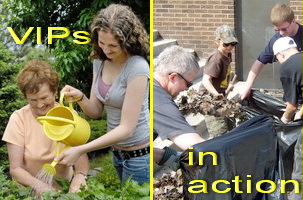True Life Stories & True Life Issues
 The classic definition of a VIP is a Very Important Person. It is someone whose stature is above the regular person. They are respected, they are recognized as special, and they are given accolades and preferential treatment.
The classic definition of a VIP is a Very Important Person. It is someone whose stature is above the regular person. They are respected, they are recognized as special, and they are given accolades and preferential treatment.
We tend to think of VIPs as movie stars, famous musicians and rich people. We're shown these famous people every day on TV and the web. The media holds them up for us to admire, suggesting repeatedly that they are special, intriguing and worth paying attention to.
 VIPs have things we'd like to have, and go places we'd like to go. They get VIP treatment — special courtesies and perks that only a few could ever experience, and that makes sense. Fancy cars, permanently reserved tables and famous companions take a lot of money, time and effort to arrange. So only the VIPs can get those things — those expensive, rare things.
VIPs have things we'd like to have, and go places we'd like to go. They get VIP treatment — special courtesies and perks that only a few could ever experience, and that makes sense. Fancy cars, permanently reserved tables and famous companions take a lot of money, time and effort to arrange. So only the VIPs can get those things — those expensive, rare things.
 VIPs are almost always separated from regular folks. They might pass briefly through the crowd, maybe walk a red carpet, but often they are given preferential and private access to the restaurants, clubs and offices that they visit. They demand, and are granted, a private space to do their VIP stuff.
VIPs are almost always separated from regular folks. They might pass briefly through the crowd, maybe walk a red carpet, but often they are given preferential and private access to the restaurants, clubs and offices that they visit. They demand, and are granted, a private space to do their VIP stuff.
Our entertainment-focused society puts the spotlight on three things that make a person important: wealth, beauty and their ability to entertain us. While there sometimes seems to be more than enought VIPs, by focusing on just these three things we greatly reduce the number of VIPs that can actually exist.
If you were to ask your friends who they'd expect to see in a VIP lounge, they're unlikely to say "my mother", "that nurse at the clinic" or "the guy at work who helped me yesterday." That's because VIPs can't be regular folks, can they?. They have to be famous, don't they? Isn't that part of the definition of a "Very Important Person".
Well, you know, now that I actually read the words, "very important person", it sounds pretty clear. It's someone who's important, to someone.
So people could be important in ways beyond wealth, beauty and entertainment value. In fact, when it comes to what's really important to most people, it would include a wide array of uplifting characteristics and life skills, such as being:
- Compassionate

- Patient
- Community minded
- Empathetic
- Dependable
- Generous
- Encouraging
Putting it this way, someone's Mom could be a VIP, and so could a nurse and a guy at work.
We'd just have to decide that we're going to share our personal VIPs, and acknowledge that they are indeed important people.
But if more (and different) people became VIPs then how would we keep track of them? Would the paparazzi be able to keep up with them; would we need to train more paparazzi? [Editor's note: check if paparazzi are actually trained.]
Or maybe these new VIPs wouldn't need to become famous in the same way. Maybe our new VIPs wouldn't want to sneak into hotels by a side door. Maybe, with VIPs being part of our every day life, we'd expect to see VIPs wherever we went. We'd tune our VIP radar to a better, more personal level. We'd listen for the respectful voice of our companions as they talked about a VIP in their life, and we'd notice the loving looks that people give to those they respect.
 We'd start appreciating just how many VIPs there are in each of our lives, and truly understand what it really means to be important to others — not for being wealthy, not for being beautiful, and not for just being entertaining.
We'd start appreciating just how many VIPs there are in each of our lives, and truly understand what it really means to be important to others — not for being wealthy, not for being beautiful, and not for just being entertaining.
When we walk down the street we'll be meeting many amazing and influential people. We'll share their stories, attitudes and wisdom with our friends and family, and incorporate and reflect their strengths in our lives.
In a world where VIP is redefined we'll find ourselves surrounded and enriched by people who understand the value of kindness and sharing.
That is the world that I want to live in.
 As for famous people, who under the old definition were automatically VIPs, there could be a more accurate acronym: like VFP: Very Famous Person. Some famous people will actually be VIPs, and certainly many famous people are leaders in helping those less fortunate. Some folks, who are less enamoured of the influential entertainment industry, might watch TV and say to their friends: "That VFP can really act. I hope they're actually a VIP too !" Staying optimistic is important!
As for famous people, who under the old definition were automatically VIPs, there could be a more accurate acronym: like VFP: Very Famous Person. Some famous people will actually be VIPs, and certainly many famous people are leaders in helping those less fortunate. Some folks, who are less enamoured of the influential entertainment industry, might watch TV and say to their friends: "That VFP can really act. I hope they're actually a VIP too !" Staying optimistic is important!
 And since rich people like to have a lot of stuff, they could also have their own acronym: VRP: Very Rich People. For the top, top level of rich people, perhaps just the top 1% of them — who are very enthusiastic about money — they could also be worthy of a deluxe acronym: VERP: Very Enthusiastically Rich People. VRPs will have to try extremely hard to become one of the new VIPs, since being generous and community-minded is not often their strong suit. They might have to shed some extra layers of money and self-focus to do it, to "slim down" and "share the joy". It could be tough for VRPs to become VIPs, so we really need to encourage them. Here's hoping!
And since rich people like to have a lot of stuff, they could also have their own acronym: VRP: Very Rich People. For the top, top level of rich people, perhaps just the top 1% of them — who are very enthusiastic about money — they could also be worthy of a deluxe acronym: VERP: Very Enthusiastically Rich People. VRPs will have to try extremely hard to become one of the new VIPs, since being generous and community-minded is not often their strong suit. They might have to shed some extra layers of money and self-focus to do it, to "slim down" and "share the joy". It could be tough for VRPs to become VIPs, so we really need to encourage them. Here's hoping!
We've been frugal in acknowledging and celebrating our real VIPs for a long time. Let's change that, and start telling each other about the very important people in our lives.
[Return to the home page of MakingMoreOfToday.com.]
Archives
- May 2020
- October 2019
- November 2018
- October 2018
- September 2018
- May 2018
- April 2017
- March 2017
- December 2016
- January 2016
- December 2015
- November 2015
- October 2015
- September 2015
- August 2015
- July 2015
- June 2015
- March 2015
- January 2015
- September 2014
- August 2014
- July 2014
- June 2014
- May 2014
- April 2014
- January 2014
- December 2013
- November 2013
- October 2013
- September 2013
- June 2013
- May 2013
- April 2013
- March 2013
- February 2013
- January 2013
- December 2012
- November 2012
- October 2012
- September 2012
- May 2012
- March 2012
- January 2012
- December 2011
- November 2011
- October 2011
- September 2011
- August 2011
- July 2011
- June 2011
- August 2010
- July 2010
- January 2010
- December 2009
- November 2009
- October 2009
- July 2009
Resources
Comments
- Twin Cities janitorial: Cleaning does not have to
- Maid Services: Your blog leaves an interesting
- Probiotics – A Virus Remover | One Shot One Place: [...] In today’s world, doctors
- Andre: Having IBS for many years
- Kimi @ The Nourishing Gourmet: Beautiful photos! We love sweet
- cadeau: Well these tips are very
- Forex Foreign Exchange Rates: I somehow dont agree with
- ?????????: Great article . Will definitely
- flomax: nice
- Linda: truelifeblog.com has become a favorite



Leave a reply